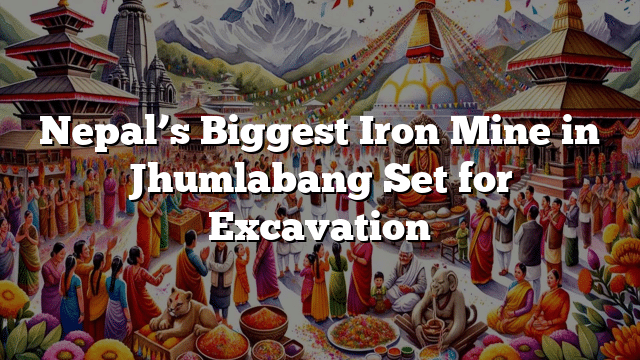
Department of Mines and Geology Prepares to Tap into 200 Million Tonne Iron Ore Deposit in Rukum East
In a significant development for Nepal’s mining industry, the Department of Mines and Geology is set to commence the excavation of iron ore from Jhumlabang in Rukum East, which is believed to be the country’s biggest iron mine discovered so far. The Jhumlabang iron deposit is estimated to contain a staggering 200 million tonnes of hematite within a 100-hectare area, making it a highly promising resource for Nepal’s economic growth and industrial development.
The Jhumlabang iron ore project was showcased at the recently concluded Nepal Investment Summit, highlighting its potential to attract private sector investment and contribute to the nation’s mineral exploration and mining activities. In preparation for the excavation, a team led by geologist Saunik Bhandari from the Mineral Promotion and Processing Centre of the Department of Mines and Geology conducted comprehensive studies in Jhumlabang last year.
Bhandari’s team collected over 1,100 samples through channel sampling, conducted topological surveys, geographical mapping, and environmental studies. The findings confirmed the presence of a massive iron ore deposit, with initial tests indicating a medium-grade iron ore purity of 45 percent.
Narayan Baskota, the information officer at the department, stated that they are in the final stages of preparing a lab test report, which will provide more detailed information on the quantity and quality of the iron ore in the mine.
The department plans to proceed with the iron excavation in phases, with the first phase involving beneficiation, a process that separates iron from the stone to produce a higher-grade product. This process involves physical and chemical processes to remove gangue minerals from the ore.
Recognizing the significance of the Jhumlabang iron mine, the Investment Board Nepal, which showcased the project during the investment summit, mandates that the individual or entity receiving the excavation permit must commence digging within two years from the date of obtaining the permit. The duration of the excavation, typically spanning more than 10 years, will be determined based on the scale of the venture, as outlined in the Mines and Minerals Rules.
The excavation of iron from the Jhumlabang mine is expected to have a positive impact on Nepal’s domestic market, as iron and steel currently rank as the second-largest imports after petroleum products. Baskota emphasized that domestically excavated and processed iron would be more cost-effective than imported iron, benefiting the country’s economy.
While the prospect of the iron mine has generated excitement among local authorities and residents, concerns have also been raised about the potential displacement of communities residing near the mine site. Rup Lal Sunar, a local resident whose ancestors were involved in copper mining in the area, expressed apprehension about the possibility of being uprooted from their ancestral land, urging the government to consider their plight seriously.
As Nepal embarks on this ambitious mining project, it will be crucial to strike a balance between economic development and environmental sustainability, while addressing the concerns of local communities. Effective stakeholder engagement, adherence to mining regulations, and implementation of best practices will be essential to ensure the responsible extraction of this valuable resource, while maximizing the potential benefits for the nation and minimizing the impacts on communities and the environment.
Related:



